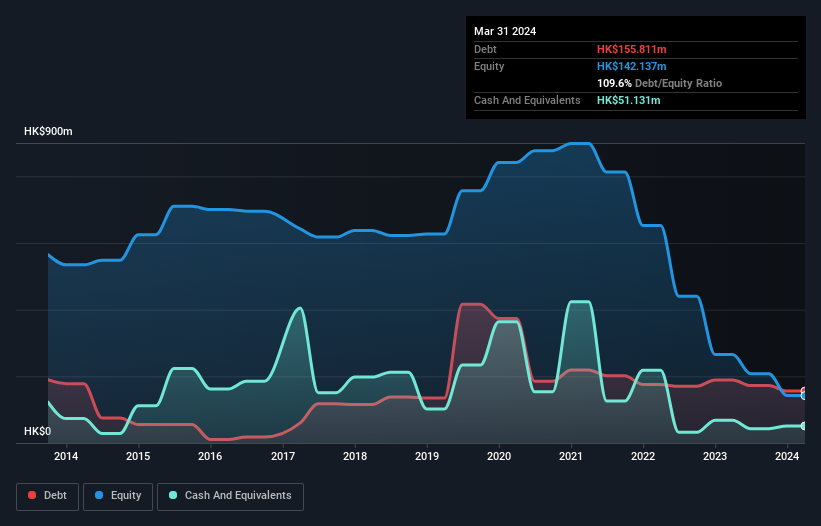
Howard Marks put it nicely when he said that, rather than worrying about share price volatility, 'The possibility of permanent loss is the risk I worry about... and every practical investor I know worries about.' It's only natural to consider a company's balance sheet when you examine how risky it is, since debt is often involved when a business collapses. Importantly, Magnus Concordia Group Limited (HKG:1172) does carry debt. But should shareholders be worried about its use of debt?
Why Does Debt Bring Risk?
Debt and other liabilities become risky for a business when it cannot easily fulfill those obligations, either with free cash flow or by raising capital at an attractive price. Part and parcel of capitalism is the process of 'creative destruction' where failed businesses are mercilessly liquidated by their bankers. However, a more usual (but still expensive) situation is where a company must dilute shareholders at a cheap share price simply to get debt under control. Of course, plenty of companies use debt to fund growth, without any negative consequences. The first thing to do when considering how much debt a business uses is to look at its cash and debt together.
See our latest analysis for Magnus Concordia Group
What Is Magnus Concordia Group's Net Debt?
As you can see below, Magnus Concordia Group had HK$155.8m of debt at March 2024, down from HK$188.8m a year prior. However, it also had HK$51.1m in cash, and so its net debt is HK$104.7m.

A Look At Magnus Concordia Group's Liabilities
We can see from the most recent balance sheet that Magnus Concordia Group had liabilities of HK$555.7m falling due within a year, and liabilities of HK$57.2m due beyond that. Offsetting these obligations, it had cash of HK$51.1m as well as receivables valued at HK$45.7m due within 12 months. So its liabilities outweigh the sum of its cash and (near-term) receivables by HK$516.1m.
This deficit casts a shadow over the HK$150.3m company, like a colossus towering over mere mortals. So we definitely think shareholders need to watch this one closely. After all, Magnus Concordia Group would likely require a major re-capitalisation if it had to pay its creditors today. There's no doubt that we learn most about debt from the balance sheet. But it is Magnus Concordia Group's earnings that will influence how the balance sheet holds up in the future. So if you're keen to discover more about its earnings, it might be worth checking out this graph of its long term earnings trend.
In the last year Magnus Concordia Group had a loss before interest and tax, and actually shrunk its revenue by 35%, to HK$271m. To be frank that doesn't bode well.
Caveat Emptor
While Magnus Concordia Group's falling revenue is about as heartwarming as a wet blanket, arguably its earnings before interest and tax (EBIT) loss is even less appealing. Its EBIT loss was a whopping HK$42m. If you consider the significant liabilities mentioned above, we are extremely wary of this investment. That said, it is possible that the company will turn its fortunes around. But we think that is unlikely since it is low on liquid assets, and made a loss of HK$117m in the last year. So while it's not wise to assume the company will fail, we do think it's risky. When analysing debt levels, the balance sheet is the obvious place to start. But ultimately, every company can contain risks that exist outside of the balance sheet. Be aware that Magnus Concordia Group is showing 2 warning signs in our investment analysis , and 1 of those doesn't sit too well with us...
If you're interested in investing in businesses that can grow profits without the burden of debt, then check out this free list of growing businesses that have net cash on the balance sheet.
Have feedback on this article? Concerned about the content? Get in touch with us directly. Alternatively, email editorial-team (at) simplywallst.com.
This article by Simply Wall St is general in nature. We provide commentary based on historical data and analyst forecasts only using an unbiased methodology and our articles are not intended to be financial advice. It does not constitute a recommendation to buy or sell any stock, and does not take account of your objectives, or your financial situation. We aim to bring you long-term focused analysis driven by fundamental data. Note that our analysis may not factor in the latest price-sensitive company announcements or qualitative material. Simply Wall St has no position in any stocks mentioned.